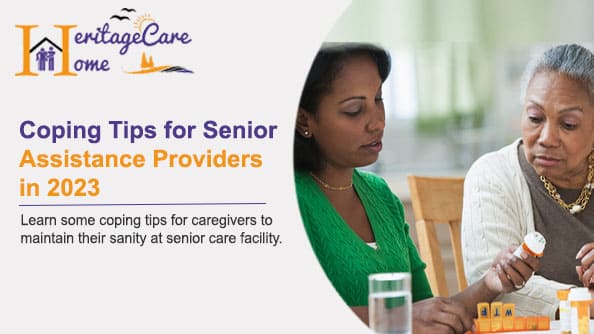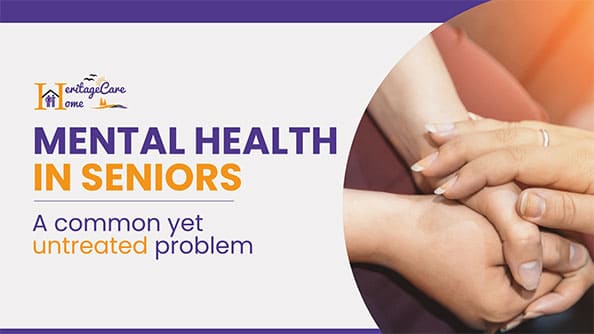Ways to tackle senior loneliness and isolation
- Admin |
- July 17, 2023
We can all relate to how lonely might feel. Since we can't share our pleasant moments with others, it makes the world a little bit grayer and duller...
Read more
For most people, providing care for a loved one is a labor of love. However, if you provide care for someone, you can attest to the exhausting days and mounting emotional stress you experience, particularly if you are the only family caregiver.


For most people, providing care for a loved one is a labor of love. However, if you provide care for someone, you can attest to the exhausting days and mounting emotional stress you experience, particularly if you are the only family caregiver.
Now, there's the additional strain of providing care during a pandemic and the extra safety measures required of you, like limiting the number of visitors your loved one has, requiring other family members to practice social distancing and wear facemasks around you and your loved one, and figuring out where to have your loved one tested if you suspect they've been exposed to someone with Covid-19. Although providing care has never been simple, the current situation is particularly challenging.
Who is providing care for a close friend or family member? Among the research's major results are the following:
In the previous 12 months, one in five Americans cared for a senior loved one or a youngster with special needs.
Baby boomers are continuing to need more care and support at home as they get older.
Two or more family members are being cared for by 24% of caregivers. This is an increase from 15% in 2015.
89% of caregivers are helping a family member; often, an adult child is taking care of a parent.
The needs of those receiving care have increased and become more complex since 2015.
Caregivers frequently complain that their loved one's healthcare system makes coordinating and accessing medical care difficult.
The majority of family caregivers are still women.
While 21% of caregivers admit to feeling lonely, they also claim that the role is meaningful to them.
Among caregivers, one in five claim that their responsibilities have hurt their spending and financial health.
You most likely relate to one or more of those trends if you are a caregiver. If so, you might value advice on how to deal with the difficulties you encounter as a caregiver.
Your health may deteriorate as a result of caring for a loved one. The prevalence of headaches, gastrointestinal issues, back pain, and depression is frequently higher among caregivers. The immune system may become less robust due to the strain of managing so many obligations. Caretakers are more likely to get the flu and the cold as a result.
Protecting a caregiver's physical and emotional health requires learning effective coping strategies for the challenges of caregiving. Here are some ideas to consider if you or a caregiver you know is having trouble:
Healthy self-care is important, but it may be difficult to practice when you're stressed out from a never-ending to-do list or worried that a loved one might get the flu or COVID-19. Taking care of oneself is crucial. Maintaining a nutritious diet, engaging in regular exercise, and getting enough sleep are essential, as are keeping up with doctor appointments and regular health exams, as well as adhering to the coronavirus prevention recommendations of social isolation, facemask use, and hand-washing.
Join a support group online: No one has a deeper understanding of the particular difficulties of caring than another caregiver. You may learn from other caregivers' experiences and have a sounding board for when things become difficult by joining an online support group. The article How to Connect with a Caregiver Support Group Online includes advice on how to do so.
Examine the following resources for health and convenience: There are several options available to help with caregiving, ranging from food delivery through businesses to home-delivered meal programs. Consider your time-consuming duties and look at ways to do them. For instance, find out if your favorite eateries participate. To find out if medications may be delivered and if your neighborhood pharmacy offers COVID-19 testing and flu vaccines, call them.
Ask for and accept help: Caregivers occasionally believe they are the only ones in charge of a loved one's care. You could believe it is your responsibility or struggle to put your confidence in others. Accepting that you can't do everything by yourself is a crucial component of being a good caregiver. Allowing assistance also eases your mind if you need to contact friends, family, or a dependable outside partner, such as Heritage Care Home. When you and your loved one are prepared to accept it, assistance is available.
To find the ideal option for you and your loved one, choose a Heritage Care Home senior living community nearby and get in touch with our team of senior care specialists.

We can all relate to how lonely might feel. Since we can't share our pleasant moments with others, it makes the world a little bit grayer and duller...
Read more
Every year, a large portion of us, regardless of age, make the same New Year's resolution: to be more...
Read more
Travel requirements and preferences can change significantly as we age, regardless of whether you are a seasoned globetrotter or....
Read more
A significant portion of the elderly population in the United States suffers from memory-related issues such as Alzheimer's or Dementia...
Read more
The majority of Americans eagerly look forward to retirement. Many people have distinct memories of traveling, exploring the nation...
Read moreFEEL THE PLEASURE OF BEING CAREFREE